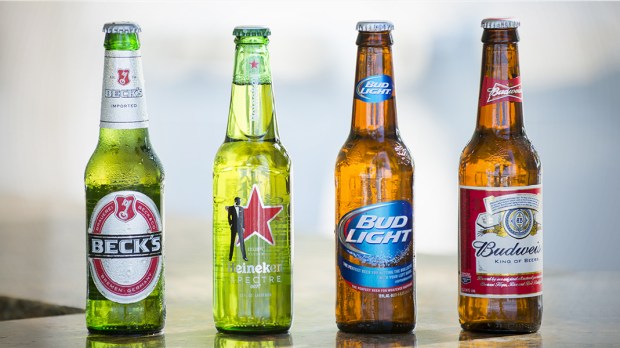In 1987, Anheuser-Busch (AB) set out to take a further step in becoming the “king of beers.” Although its trademark brands had long been a great seller with 25- to 45-year-olds, the company initiated a bold marketing ploy to (officially) market to the 21-24 crowd.
Enter Spuds McKenzie, an English Bull Terrier who looked like the cool guy [dog] plucked from the bikini-crowded beaches of southern Cal. To AB’s delight, he became an instant celebrity — not just with the young, drinking crowd, but with the media and country as a whole. He ended up on Late Night with David Letterman and made countless appearances on shows and events across the country. He became so popular that AB’s main PR firm assigned him his own rep to handle the flood of requests. In the first year of the “Spuds” campaign, overall Bud Light sales shot up by 8 million barrels, or 21 percent.

Read more:
How to teach our children to survive the “likes” culture
Eight years later, AB was back again in its zany attempt to gain a greater market share. This time it wasn’t a dog, but frogs croaking “Bud… weis… er.” Even more widely embraced than their canine predecessor’s, the frogs’ commercial was the most popular ad for three months running on USA Today’s tracker. It even spawned a Louie the Lizard campaign that became even more popular, especially when stories of a ferret hit man became part of the story. Together, the frogs and the lizard pulled AB out of its “slump,” and for the first time the company had the #1 and #2 selling beers in the world.
Amid all the accolades and the advertising genius remained one seemingly unimportant fact. Neither the dog nor the frogs nor the lizard or even the ferrets changed the beer to any degree. Taste, calories, and alcohol content never shifted. Nor did AB’s attempt to use these ads to prove that their beer had suddenly undergone a transformation that warranted a greater consumption. It didn’t matter. Sales increased anyway.
According to author David Eagleman, we shouldn’t be surprised. In Eagleman’s bestselling book, Incognito, he tells a captivating story of the role our unconscious mind plays in our everyday life. He gives a humbling, research-based account of just how little our conscious thoughts guide our daily behaviors. He details how many daily activities, such as what we eat, drink, read, and even buy, are largely programmed into our brain without clear awareness or rationale, just as the Budweiser campaign successfully did.
If we are honest, this message is a shock to our ego as parents and individuals. Most of us would like to think that we make decisions based on sound reasons and clear facts, and resent the idea that we can be influenced by goofy marketing ploys and gimmicky ideas. But for every billion dollar advertising budget (which was AB’s in the 1990s), there is a reality we can’t hide from. Companies don’t spend exorbitant amounts of money on propaganda because it doesn’t work.
In this day, when advertisements are as ubiquitous as cheap, processed food and live-streaming video, it should give us pause about just how much all of this influences us, and especially our kids. Estimates vary widely for just how many ads our kids see each day; even the most conservative numbers suggest that our kids see 7,500 marketing images per month (and the most liberal estimates suggest up to 100,000). And the sobering reality is that whether it is McDonald’s marketing its new toys or 30-second network marketing of callous sex and frivolous violence, all of this is formative in the minds of the youthful and even the not-so-youthful.
Read more:
The Catholic Guide to Surviving Christmas Commercialism
No matter what we think about the world of advertising and media, there is no doubt that the science behind it has much to teach us about who we are, and how we can be more effective in the roles we have. Inherent in all of this are obvious messages and implicit ones. The obvious messages are that as individuals and parents, we must be conscious of the rate and type of our exposures because whether we like to admit it or not, they do influence us. It isn’t just the goofy and creative ones either. Companies know that the frequency of exposure is also strongly associated with behavior. That is why AB spent much of its budget trying to make itself visible, whether by having their logo on roadside billboards and baseball venues, or even paying for restaurant menus so that their beers would be featured prominently.
As parents, it is easy for us to become complacent with the idea that our kids are probably going to be exposed to all sorts of messages that we can’t prevent. But we should understand that if we reduce the percentage of exposure by even a small amount, it may help alter just how much our kids (and we) are influenced. Turning off commercials may seem like a trivial intervention, but over the course of decades it may significantly reduce impact of advertising.
Yet, just as the story of AB provides a cautious tale for us, it also suggests that we as parents must be savvy and persistent if our “propaganda” is going to be effective, too. As an example, parents of young kids routinely fail to find ways to get their kids to eat a balanced, healthy diet. One reason is that they simply underestimate the number of times (and just how) food must be introduced, or advertised, before a child finally adopts a taste for it. We all get frustrated when our discipline seems ineffective. But we are often too quick to abandon a good strategy, and find ourselves in a rut, instead of looking for creative ways to reinforce it over a longer time. Although none of us has the capital to market like a beer giant, we do have time, drive, and love on our side.

